LingQ
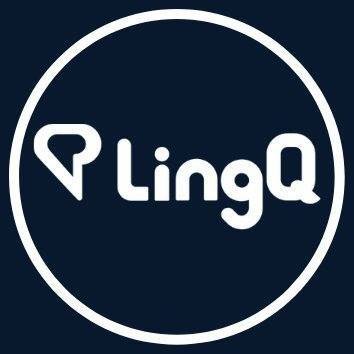
Summary
LingQ is a language-learning platform that focuses on extensive reading for over 30 different languages. You can import your own content or choose from the community library of books, articles, podcasts, YouTube videos, and more.
The app highlights unknown words across every lesson and makes them reviewable via different types of SRS flashcards. The more you read, the more accurately you will be able to identify content that is suitable for your level.
Although I did not find it beneficial for languages I had never studied before, I think LingQ can be helpful for upper-beginner to advanced language learners who enjoy reading. It is especially helpful if you struggle to find graded readers in your target language.
The LingQ reading app is enjoyable in most languages, easy to use, and can expand your vocabulary. However, I found the user content frustrating to navigate.
With the import function, users can choose to study almost anything they want.
Now that other apps provide similar functions, the monthly subscription may be a bit overpriced. However, the yearly subscription seems fair.
I Like
- I can easily import almost any material I want to study.
- I can use SRS flashcards to quiz new words from a specific page.
- Each lesson in the library displays the percentage of known and unknown words based on my reading history.
- There are many dictionaries to choose from for definitions.
I Don’t Like
- Reviewing words is chaotic. Every word you look up gets added to a huge queue that quickly becomes unmanageable.
- The extra features are overpriced and can be found other places for cheaper.
- Very little of the content is original. Much of it was uploaded by users from other places.
- The free version is extremely limited.
Price
Premium membership costs $12.99/mo, $71.94/half-year, $107.88/year, $191.76/2-years; single-language lifetime membership costs $199
When I first signed up for LingQ, I wasn’t very impressed. Its seemingly random lesson library, filled with custom cover photos and inconsistent title formats, made me want to click on just about anything to get away from that page.
However, after exploring every function I could find, I realized that the reading tool has several useful functions for anyone trying to learn a language through extensive reading. Most importantly, it makes reading in other languages feel manageable.
The site has three main pages: Lessons, Tutors, and Community. Within them, you can find free and purchasable lessons, coins, an avatar, writing exchanges, a community forum, audio playlists, and challenges.
I mostly used LingQ for reading in Spanish and dabbled in French, Chinese, Japanese, Swedish, and Korean.
Choosing a Lesson
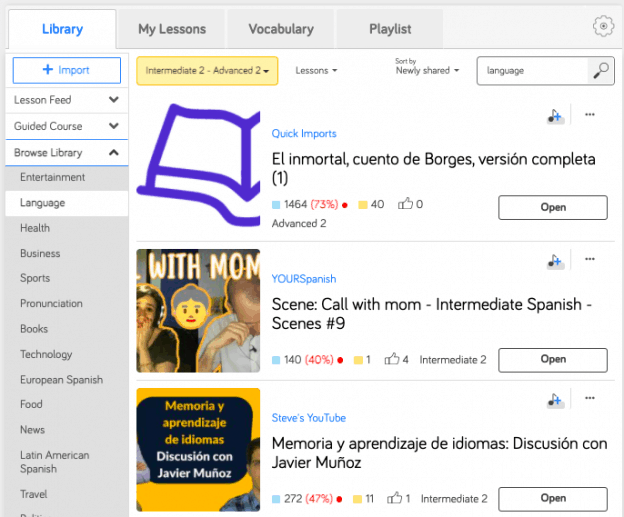
Judging by how LingQ advertises learning a “language from content you love”, I assumed that the lesson library was where the gold is. However, I felt like I was looking at a pool of random content rather than curated texts and struggled to identify lessons that sparked my curiosity.
Although LingQ lets you browse the lessons by topic, the lessons didn’t always match the topic I had chosen. I eventually chose a guided course, which consisted of a more organized series of lessons within a specific theme.
Each title in the library displays the percentage of new words within the text plus the number of words from which you have created LingQs (we will get more into that in a moment).
As you read and differentiate between known and unknown words, you will be able to assess which content is most suitable to your level.
You can also see how many people liked the lesson and the level category (although these are determined by whoever uploaded the text, so they are not always accurate).
It seems that users contribute most of LingQ’s content and source it from podcasts, books, magazines, news sites, textbooks, and more. Sometimes I found high-quality lessons uploaded by paid resources themselves to advertise their products.
Although LingQ does its best to delete copyrighted content, they do not seem to be actively filtering through the lessons and courses. Therefore, you may occasionally find plagiarized books or other media on the site.
LingQ has a series of guided beginner courses whose lessons build on one another, introducing a limited number of new words each lesson and continually reinforcing them in each section. Unfortunately, after you go through the basic lessons, you will mostly be on your own to find content appropriate for your level.

Finally, the “Lesson Store” tab includes paid material. At the time of this writing, they were only available in Spanish and included material by popular products such as Linguaphone and Spanish Stories by Olly Richards.
Importing Your Own Material
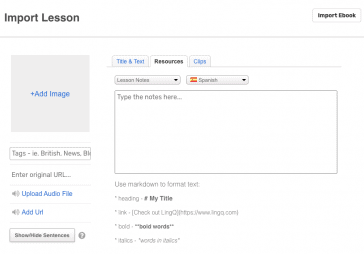
The best part about LingQ is that they make it easy to import almost any ebook, blog post, news article, YouTube video, and even Netflix subtitles into the app.
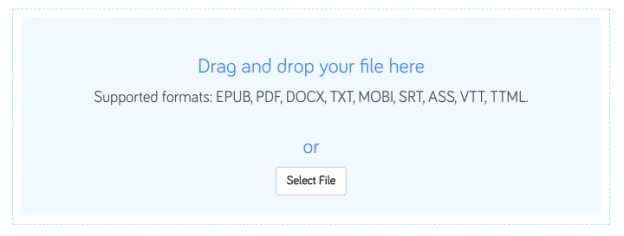
With the LingQ browser extension, it gets even easier — I could import blog posts and news articles in seconds and open the lesson directly from that page.
And that’s not all.

The LingQ browser extension can also import any YouTube, Animelon, or Viki video with subtitles. Then, it will create a downloadable audio file from the video that you can sync with the subtitles. Sometimes it takes a bit of tinkering to get the audio and text to sync, but the platform makes it relatively straightforward to do.
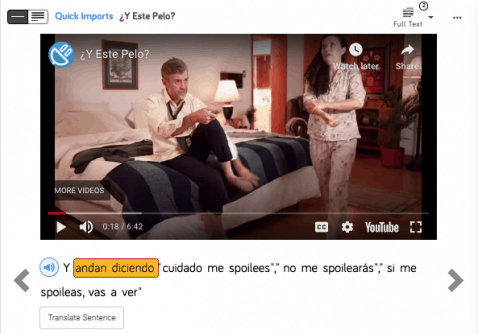
I enjoy watching YouTube videos in Spanish, but I’m often not sure how much I actually understand. My favorite way to use LingQ was to import a video, then read and listen to the subtitles one by one. After several repetitions, I was able to listen to the audio without the text and identify words that I had originally only understood through context. A similar tool is available on Yabla, but it doesn’t let you import your own content, nor does it highlight your unknown words
Lessons: LingQs and Definitions
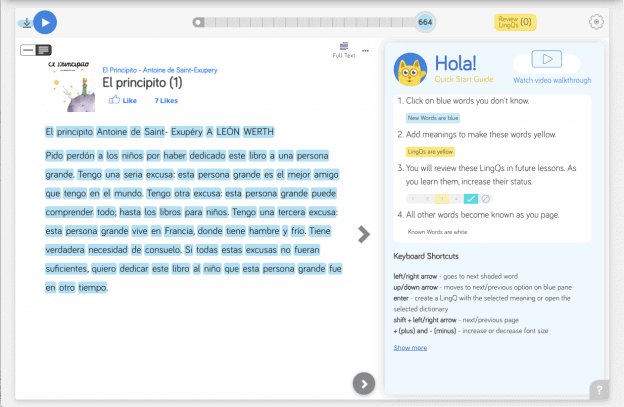
The first lesson that you open, whether it be from LingQ, another user, or personal imports, will have a mass of blue words. Your goal is to turn all of those words either yellow or colourless to complete the lesson.
By clicking on blue words or phrases, you automatically turn them yellow and create a LingQ. These LingQs earn you coins and also appear in SRS flashcards for later review. You can then choose a common definition from the community or write your own from a dictionary of your choice.




Although there is also the option to identify how well you know the word on a scale of 1-4, this is only relevant if you consistently use the SRS flashcards or if you want to see your words appear in different shades of yellow.

Once you have chosen a definition, you can see a list of common questions about the word or ask a community tutor in the forum.

Flipping to the next page will mark all blue words as known, while the arrow in the bottom right-hand corner allows you to review all of the LingQs from the current page through SRS flashcards.

A neat feature in English, French, Portuguese, Italian, German, and Russian, is that verbs will automatically generate a series of tags to identify who is speaking, the infinitive form, and the verb tense. Keep in mind that identifying one verb tense as known does not identify any other conjugation of that verb as known.
Many lessons also include an audio file with adjustable speeds, which will be added to a playlist after you have completed the entire lesson. I found it helpful to listen to the audio after reading the text to test my listening comprehension.
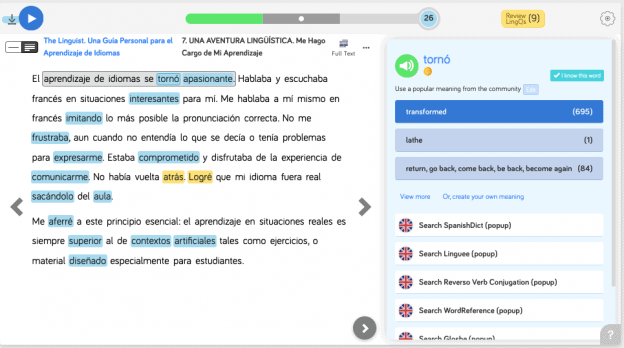
Of all the functions LingQ’s reading tool provides, I was primarily motivated by watching blue words decrease in frequency as my LingQs and known words increased.
Flashcards
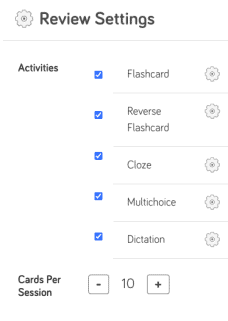
There are several types of SRS flashcards that you can use for reviewing LingQs, either with specific words at the end of each page of a lesson or in the vocabulary section at any time. These include regular flashcards, reverse flashcards, cloze deletions, multiple-choice questions, or dictations. They are based on the definitions and contexts from which you chose each word.
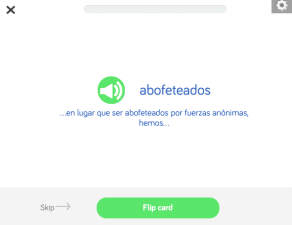
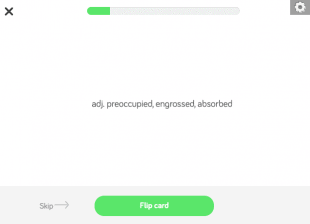
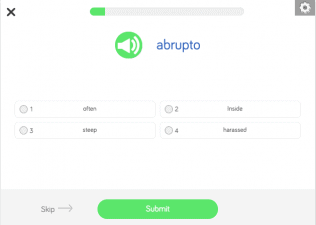
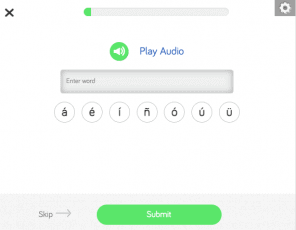
If you are a beginner or intermediate learner, you may be intimidated by the numerous LingQs that appear for review by the end of a lesson.

But, fear not — LingQ explicitly states that the purpose of the platform is to learn words in context, and it is not necessary to go back and review hundreds of LingQs at a time.
Personally, if there were 6 – 7 LingQs on a page I was reading, I reviewed them for extra practice, but any more than that and I moved on.
Lessons in Chinese and Japanese
LingQ’s structure is not necessarily a best-fit for all languages. I found LingQ enjoyable, motivating, and effective for my Spanish studies, but far less so for Chinese.
Unless you want to read as much of your own content as possible, I think that Chinese and Japanese learners will find more specialized support from graded readers. Typically, these provide context-specific definitions and explanations.
For example, The Chairman’s Bao identifies grammar, keywords, and proper nouns, in addition to providing writing practice, stroke order diagrams, and flashcards. Satori Reader for Japanese also identifies key grammar points and vocabulary explanations for how words are used in specific contexts.
Given that LingQ serves so many different languages, it’s understandable that most of these very helpful features are not available on the platform. However, LingQ’s lack of specialization does make it difficult to recommend for these languages.
Other Features
Combined with the SRS flashcards, the reading tool was the only part of the site that I enjoyed using. The rest of the platform seems to mush features from several other resources together, most of which detracted from my overall experience.
Community Features
In theory, it can be motivating to have a community of fellow language learners who interact with the same resource. However, I found LingQ’s approach to integrating these features less effective than with other apps.
There’s a community forum for language learning discussions, a series of language learning challenges, and an area for writing exchange.
I found the writing exchange feature to be less interactive and customizable than those in LangCorrect or Busuu. This could be because users can’t filter the language they want to provide corrections for. Therefore, whether or not you receive a correction may be dependent on if a native speaker is looking to correct someone’s work at the exact moment that your sample appears near the top of the writing feed.
Tutors
Anyone can become a community tutor and set a rate for both speaking and writing corrections. Like Verbling and italki, LingQ takes 15% of the charged fee. Unlike Verbling and italki, there don’t seem to be any student testimonials, and I couldn’t see how many students contributed to the tutor’s star rating. Ultimately, I prefer to use iTalki or Verbling, where the application process for tutors and teachers requires more verification.
Avatar
The purpose of the reading tool is to create LingQs, which in turn earns you coins. However, the only way to spend these coins is on your avatar’s clothing and background. Therefore, one might assume that the avatar would be an important feature on LingQ.
Not so much.
Judging by the outdated Comic Sans font in the avatar store, and everything else about it, I don’t think it has been updated in several years.
The way users can interact with the avatar items is limited. Each clothing item is attached to an outfit, so as much as I tried, I could not make my flamenco dancer wear soccer shoes.
Additionally, several background items require the purchase of a previous background item, but these items cannot be used simultaneously.


I was pretty disappointed that I couldn’t use my LingQ coins for anything useful, or at least enjoyable. Hopefully, LingQ will change this in the future.
LingQ Does Not Provide the Same Support as Graded Readers
LingQ’s approach to providing level-appropriate content is based on the user’s experience using the app and not on pedagogically curated material. Therefore, I would only use it at times when my goal is to read as much content as possible. Otherwise, I would still prefer graded readers or graded reading apps.
Du Chinese, the Chairman’s Bao, and Pleco’s graded readers are still my first recommendation for Chinese.
Beginner and intermediate German learners with Android devices may prefer Readle, which has reading comprehension questions at the end of each level-appropriate lesson.
Although I have not tried Satori Reader, our team’s review paints it as an ideal app for advanced Japanese learners who are nearly, but not yet ready for native speaker content.
Only the Premium Version is Worth It
Given that the best part about LingQ is being able to identify known and unknown words at the glance of a page, the free version is pretty much useless.
It only allows 5 imported lessons and 20 LingQs total — whether or not you delete them from your vocabulary list. Exceeding this limit prevents you from looking up definitions, marking words as known, or identifying unknown words. To me, this completely defeated the purpose of the app.

On the other hand, the Premium Plus version at $39.99/mo adds 3000 points each month, which allows you to purchase live classes, writing corrections, group discussions, and lessons from the lesson store. All of these features can be easily replaced by higher quality services, such as italki and LangCorrect.
So, I would only recommend the premium version, which costs $12.99/mo or $107.88/year.
Downgrading to the Free Version is a Pain
One frustrating part about LingQ is that the developers make it very difficult to downgrade to the free membership.
First, LingQ will try to entice you with several different offers to make you stay. One of them gives you 50% off three months. Another offers you the “Vacation Plan,” which costs $2/month to store all of your data. Lastly, it will offer you a lifetime plan for one language.
Once you get to the last offer and click “delete my data,” you will probably encounter a popup that informs you to delete all but 5 of your lessons.
It is impossible to downgrade unless you go back and manually delete your lessons, which is disappointing if you were planning on using them for the remainder of your payment period.
Similar Resources
OPLingo has many similar features to LingQ, including allowing you to import your own text, embed YouTube videos with subtitles, and identify unknown and known words. The free version allows you to look up unlimited words, but like LingQ, it also limits users to adding 20 unknown words.
I am a huge fan of OPLingo because of how they use their subscription fees for international outreach projects, but LingQ currently has a more intuitive and developed user interface.
Readlang also has a similar, limited free function, which allows you to identify words you are learning across texts. It also rates the difficulty of each text in the library based on the CEFR scale (although the accuracy of this is questionable). Unfortunately, it only supports .txt and .epub imports, and it takes far more effort to sync YouTube subtitles compared to LingQ.
Final Thoughts
I found LingQ most effective and enjoyable for Spanish, which I can read at an intermediate level. It was least useful for languages in which I have no background or am mostly fluent.
Although I did not enjoy the lesson library, I’m sure that others would see it as a goldmine for interesting content. I was more than happy to use the import functions for my own material without sifting through community content.
I would not use LingQ for any feature except for the reading tool, but this feature is so useful that it would be worth the subscription price.
The SRS flashcard system is great for reviewing vocabulary on specific lesson pages, but I would never try to learn all of my accumulated LingQs through regular review. I prefer to learn new words through paying special attention to those I had previously highlighted and incorporating some words into writing for correction by my Spanish tutor or the LangCorrect community.
Overall, I have a lot of criticisms about the platform as a whole, but I think the reading tool is great. If you don’t need to look at a fancy user interface or import PDF files, Readlangand OPLingo are fine alternatives.
Our top picks for language resources vary by language — you can find our favourite reviews for the language you’re learning at the bottom of this page.


Nice review, was a big help!
I like LingQ. I don’t really care about the original content and I enjoy that I can import native content easily. I actually find it a bit annoying that they won’t add languages without the mini stories, since I don’t generally look at them.
I find the issue with language learning (and with so many things actually), that there is so much content and courses and tools for beginners, but once you’re past that stage but not quite at the level where you can just start consuming native content, there isn’t that many interesting things. For me this is where LingQ comes in: I can read harder texts than my level would allow, because the word lookup is so easy. I can choose whatever that interests me, and not be tied by the imagination of someone making a course that they think would be good for my level.
I do actually use LingQ for beginner stuff as well. I import lessons from my beginner’s books (it’s totally ok, as long as you keep them private just for you! I think they would also remove any copyright material if it’s noticed). This way I can read my chapters efficiently and review them also if needed. I don’t like flash cards anyway, so I don’t use that feature.
There are others and I haven’t tried all of them, but so far, for me, LingQ seems to work best for the languages I’m studying. There are huge differences especially what comes to languages with different writing systems and at least in Persian LingQ seems to work pretty well (but I’m a beginner, so…). The only thing that doesn’t work in Persian is the text-to-speech, but I’m more interested in the reading part anyway.
I agree that some of the features could be removed to have a cleaner experience, there’s a new version coming up soon, so I’m hoping it makes the site a bit more user friendly. But for the languages I consider more intermediate, I find LingQ a valuable resource!
Yea, it’s very strange and I’m not really sure how they’re able to use other people’s content without crediting them. I think it’s just because users add the content and LingQ doesn’t enforce where it comes from.
I’m under the impression that they’ll take it down if requested by the creator. That’s just from seeing some content on there before and then when I used the app later it seemed to be removed, but I’m not really certain about this.
thanks for the review.
i tried the free version of LingQ. Within a few lessons, i immediately recognized the voice of one teacher who puts out lot’s of free lessons on YT.
(does LingQ at least give the original creators credit? i did not see it
Anyway, i decided right away not to pay the subscription for the same reason you describe.
Thanks for bringing that up! While not exactly the same, the Rikaikun extension can be really useful for Japanese.
In regards to Japanese – readlang is not good, they state it on their site too “limited support for Japanese, words are not prioritized based on frequency and no sorting by text difficulty “
Great article Nick! I agree with pretty much everything you’ve written here, especially about being overwhelmed by the review list. I also don’t see the point in the avatar, although I find myself weirdly excited when I can afford to buy him something new ?
I think for me another plus is that it seems to be one of the few readers out there with a decent mobile (at least Android) version. Although I haven’t tried the mobile-web versions of, say, Readlang, for example.
A bit disappointing though to see that even after a year since this article was written, the website and app seem to be exactly the same; still with plenty of bugs and sharp edges. Let’s hope they’re working on a newer, slimmed down version…
Cheers
I completely agree and didn’t realize how awesome Readlang is until recently. They have a public library section where you can filter content by difficulty level, length, or topic. Plus, most people would likely be more than happy with the free version and not need to upgrade.
For anyone interested in LingQ but is either deterred by its high price tag or its messy interface, I strong recommend Readlang. It shares the same philosophy but comes with a much cleaner interface. The free version is very functional and the premium subscription is very affordable ($48 per year).
Cool, it’s nice to see some free alternatives coming out.
languagetools.io is a new site that has a reading tool. I believe it handles Asian languages better than any other tool available. You can split/join Mandarin, Cantonese, Japanese Korean and Thai. Soon to come – Vietnamese. It supports 104 languages, and it’s free.
Thanks for sharing!
Maybe you can give a try to a newly released tool called VocabSplitter, which uses the same methodology as LingQ. It supports studying many languages such as Spanish, French, German, Chinese, Italian and more languages are being added. And I believe its automatic Chinese word segmentation algorithm is the best in the market so far. In order to use the tool, you have to find the texts on internet and then import the texts into the tool. Then you can read the texts in the same way as LingQ. The best part is that the tool is free.
I has been using LingQ for 6 months and was very impressed first but later I changed my opinion and stopped the subscription.
I used Android version and faced with many bugs and other issues. Support team mainly ignored all reports writing some standard phrases. I had problems with unselectable words, blue words after completing the lesson.
When I listen to some lesson I expect that text is in sync with the audio. They don’t have this feature so I had look for a place in text. Player is inconvenient as it is too easy to tap on the progress bar and move to another part of audio. When I create LingQ the whole sentence is added as an example but in review it doesn’t fit in screen and its sound is computer generated.
Total number of known words is wrong at least because all forms of a word (single/plral/past) are counted as different words. in Turkish one word may have hundreds of forms so this number is useless.
UI is quite messy, same as many dictionaries. Some of them are unscrollable so some part is invisible.
For $10/month I wanted a better service and when they raised it to $12.5 I just unsubscribed.
I think we’re misunderstanding each other.
why would anyone want original content?
Much of the content you find on LingQ wasn’t created by them. Because of this, you could study using the same content for free by going straight to the creators of it. In this way, LingQ is more of a middleman.
sure, when you don’t know the language everything looks cool, but half way through you start to understand that someone translating their mother language into the language you’re studying only teaches you to make mistakes.
I don’t really understand what you mean here.
i’d much rather learn by listening (and by extension reading) the content made by natives who make content for natives.
I agree to an extent. If you’re at a lower level, the material written for natives will be so difficult that you don’t understand enough of it. I’d prefer to read something that I could have 75% comprehension on the first read/listen, than something I could have 25% comprehension. Though, there’s definitely room for both.
being original in a language is a sure fire way to end up translating your language into another language word by word, or at least ending up with bad grammar.
I think we have different ideas as to the meaning of being original. I just meant that it was content created by LingQ and not from other sources.
so if this is the biggest problem you have with lingq, i don’t know what to say about this article anymore.
No worries, take care. By the way, I don’t hate LingQ by any means. I just think there’s lots of room for improvement.
why would anyone want original content? sure, when you don’t know the language everything looks cool, but half way through you start to understand that someone translating their mother language into the language you’re studying only teaches you to make mistakes. i’d much rather learn by listening (and by extension reading) the content made by natives who make content for natives. being original in a language is a sure fire way to end up translating your language into another language word by word, or at least ending up with bad grammar. so if this is the biggest problem you have with lingq, i don’t know what to say about this article anymore.